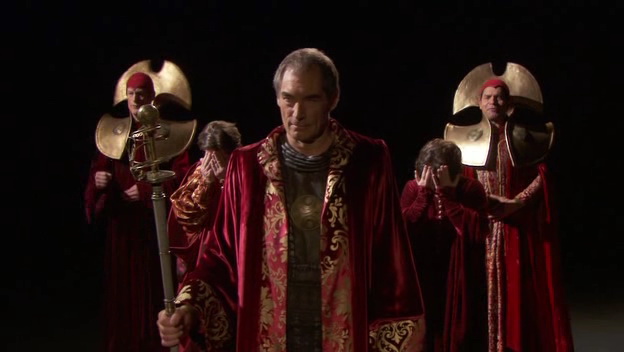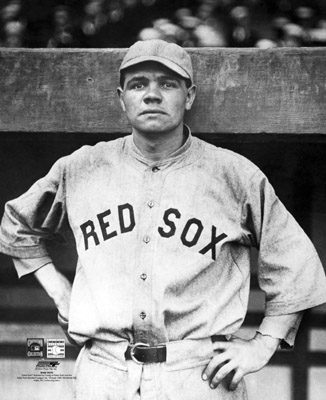Doctor Who, a long-running British science fiction program with significant cultural influence, underwent a grave decline in popularity in the late eighties, leading to its abrupt cancelation in 1989. When it was revived in 2005, only one significant change was made: the offscreen annihilation of the titular character’s home planet, Gallifrey. Briefly, during the show’s original run, the Doctor, a time-traveling alien interested in humanity’s fate, had regularly been monitored, called to trial, and policed by the high councils of his planet. Stuffy, vaguely high Anglican, and intensely hierarchical, though broadly socialist, the Gallifreyans called into question the Doctor’s outlaw forays into historical alteration, their endless trials and deliberations gently mocked by the program’s liberal creators. Nevertheless, these trials were depicted, and in excruciating detail – the Doctor was defined by his anti-authoritarianism, true, but Gallifreyan authority provided an omnipresent foil for that anti-authoritarianism, a trait only defined by its opposition to some concrete authority.
In 2005, everything changed. The Doctor had returned, but the Gallifreyans were dead, killed – the show heavily implies – by the Doctor himself, who had made the unthinkable decision to destroy his race in order to end a seemingly interminable cold war with the Daleks. The first Doctor in the new episodes, played by Christopher Eccleston, was bald and guilt-ridden, of apparently working-class origin, evoking, intentionally or not, Mikhail Gorbachev, who, in the late 80s and early 90s, had made the decision, inconceivable at the time, to end the Cold War by ending the Soviet Union itself. The next Doctor, David Tennant, apparently over the guilt, gave himself over to a Christ complex constantly reinforced by score choices and cruciform posturing, his inevitable death and regeneration hinted at for seasons before it actually occurred. When it does happen, it happens something like this: the Master, a Gallifreyan in exile who has only recently learned of his planet’s destruction, reveals himself as a fellow expatriate to the Doctor, displaying everywhere the phrase “You are not alone.” After a number of confrontations, the Master devises a plan to restore Gallifrey at the cost of Earth; the Doctor, torn, eventually decides to oppose him, defeating him easily but sacrificing his own life for a single human being’s in the process. Gallifrey returns to the ash-heap of history.
In Man of Steel, the new Superman movie, we see Superman’s home planet of Krypton, its elder council adorned more or less identically to the Gallifreyan politburo. For reasons vaguely described but somehow associated with Communist lack of choice, Krypton dies, with Superman the last of his kind. When he approaches the messianic age of 33, he discovers – through a series of TV messages proclaiming, once again, “You are not alone,” – that Zod, general of the Kryptonian armed forces, has also survived the planet’s death. Zod devises a plan to bring Krypton back – at the expense of Earth – Superman stops him, destroying, in the process, thousands of unborn Kryptonian babies preserved in vats, each one predestined for a career as worker, soldier or scientist under the socialist Kryptonian regime. In the process, Superman undergoes the passion of the Christ, but never actually dies, instead snapping Zod’s neck in Chicago’s Union Station to affirm uniquely American conceptions of liberty and freedom of choice.
My point is not that the plot of Man of Steel was cribbed from Doctor Who – it clearly was, but that is not at all central. The point is that the two works embody a deep-seated Anglo-American cultural anxiety that the Soviet Union will return from its shallow, unmarked grave and demand revenge. If it is not wholly clear, the 2005 retcon of Gallifrey’s 1989 collapse is a direct product of the collapse of the Soviet Union, in turn the final nail in high modernity’s coffin. The Gallifreyans, a weird mix of high Anglicanism and Soviet bureaucracy, established the Doctor as a rebel simply by existing, by practicing their socialist traditions, and by expecting that he be held to the same standards as any other Time Lord. In postmodern 2005, there was, it seems, no longer any time to depict the authority – it is enough for us to be told that the Doctor is the only superhuman of his kind, answers to no law, and is, like any good Lockean Englishman, a compulsive anti-authoritarian. In short, the Doctor became Protestant Jesus. Also Protestant Jesus is Man of Steel’s Superman, a deliberately Christological figure who not-dies to free us from our not-sins – America is already free, from sin, communism, and everything else. This Protestant Jesus is thus posited against the nostalgic or ostalgic Master/Zod, an irrational figure seeking to bring Gallifrey or Krypton’s totalizing hierarchy back from the dead, at the expensive of Earth. Earth, of course, is England, or it is America – its defining characteristic, in any case, is a naïve, Platonic belief in individual freedom of choice, against the alien collectivity the Doctor-Superman has so assiduously trained himself out of. The Doctor-Superman, as an adoptee of Earth, must choose to kill his planet – twice, in the case of Doctor Who – in order to preserve that freedom, re-enacting the mass trauma of the Gorbachev decision in order to remind the West that it really did win the Cold War.
Additionally, both stories are decorated in what can only be described as a Protestant terror of Catholicism – the Gallifreyans and Kryptonians wear elaborate headgear meant to evoke Vatican pomp and circumstance:


The heroes, meanwhile, dress Anglo-American, in the casual suits and chic glasses of the bourgeoisie. The totalizing hierarchy of Gallifrey and Krypton are thus doubly frightening to the capitalist classes, as they simultaneously represent the socialist hierarchy of the Soviet Union and the religious hierarchy of pre-capitalist Europe. They are Inquisition and KGB, pope and gensec all rolled into one: cumbered by tradition and red and gold clothing, they are the ultimate bourgeois nightmare (and not, as it turns out, Michael Caine’s millions). While disguised as a passion play, the “sacrifices” of the Doctor and Superman are in fact a pageant of bourgeois revolution, meant to ensure its victors that “they were the sane ones” and that “it won’t come back.” Interestingly, while Man of Steel purports to have a Catholic message about birth control and modernity wrapped up in its narrative of why Krypton fell, the ultimate solution to Krypton’s population control and neo-one-child-policy is quite literally to abort thousands of Kryptonian unborn, a feat executed singlehandedly by Superman, who has decided to finish the job that the Kryptonian apocalypse started. The message, thus, is “if the state uses birth control on a mass scale, God will smite you, but an abortion performed by an individual is fine” – in this way, Protestant Jesus eradicates the last trace of midcentury collectivism in the superficial name of religion, which is nothing if not collective (but not, apparently, for the Protestantism of Man of Steel). Doctor Who’s Doctor, likewise, adopts the cruciform position, sacrificing himself for a single human in the process of killing Gallifrey all over again.
This positing of a shallow religious fundamentalism against secular collectivity is reminiscent of the typical scapegoating of Soviet reality as “too modernist” by some midcentury paleoconservatives in order to draw liberals “back into the fold.” The process was repeated with more verve in Afghanistan, where Islamic fundamentalists were taught to feel the “Godless modernity” of the USSR was less sympathetic to their interests than the capitalist, but Bible-believing, USA. Unfortunately, the message behind both stories is fundamentally liberal and atheist, as is Protestant Jesus – much more liberal and atheist, in the Enlightenment tradition of both movements, than the Soviet Union ever was. As the bourgeoisie symbolically re-kills its enemies again and again, we must ask ourselves to what purpose the repeated condemnation of unfreedom and collectivity is being propagated. We must question the value of condemning egalitarian illiberalism at all.
(i wrote this at 5 int he morning drunk out of my senses please dont judge )

